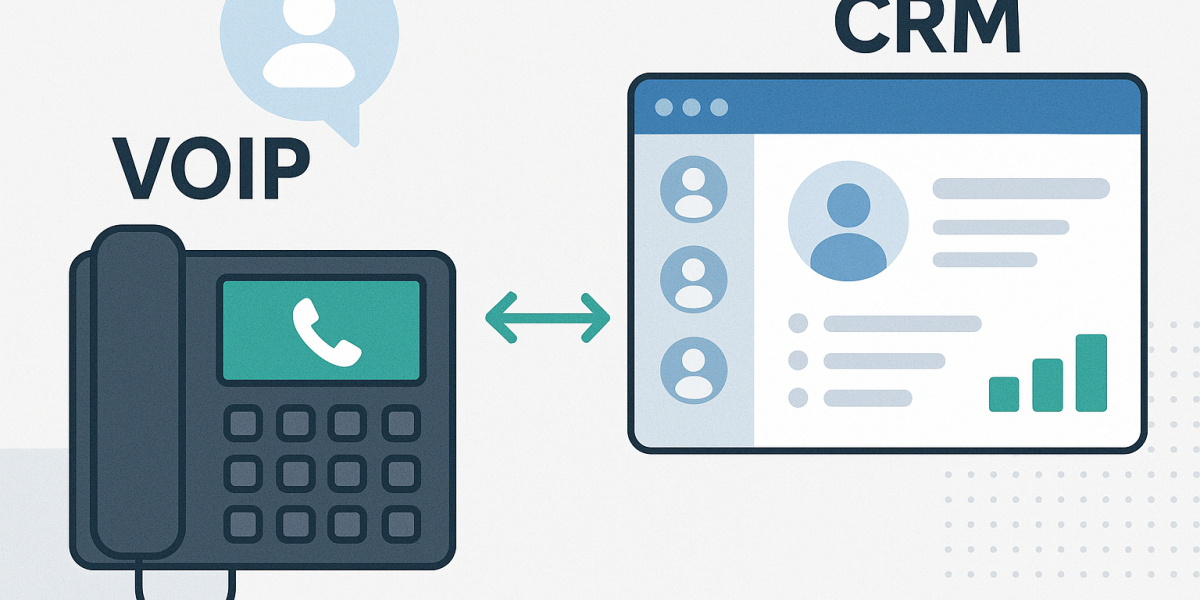In today’s competitive and fast-paced business environment, seamless communication and intelligent customer relationship management are crucial. The integration of VoIP with CRM software has revolutionized how businesses communicate with clients, manage leads, and streamline workflows. By combining telephony and customer data in a single platform, companies can improve productivity, enhance customer satisfaction, and make data-driven decisions.
What is VoIP?
VoIP stands for Voice over Internet Protocol. Instead of using traditional telephone lines, VoIP transmits voice calls over the internet. This method is more cost-effective, scalable, and offers numerous features that traditional phone systems cannot match. VoIP is now widely adopted in both small businesses and large enterprises due to its affordability and flexibility.
Key features of VoIP:
Call forwarding and routing
Voicemail-to-email transcription
Call recording
Auto-attendant and IVR (Interactive Voice Response)
Video conferencing
Call analytics
What is CRM Software?
CRM software is a system that helps businesses manage interactions with current and potential customers. It stores information like contact details, communication history, purchasing behavior, and preferences, providing a 360-degree view of each customer.
Key features of CRM:
Contact management
Sales pipeline tracking
Lead and opportunity management
Task and calendar integration
Reporting and analytics
Marketing automation
Customer service management
Benefits of Integrating VoIP with CRM Software
Integrating VoIP with CRM software creates a powerful combination that improves communication, collaboration, and customer engagement. Below are some of the key benefits:
1. Streamlined Communication
Integration allows employees to make and receive calls directly from the CRM dashboard. They no longer need to switch between systems, which saves time and reduces errors.
2. Click-to-Call Functionality
Sales and support agents can initiate calls with a single click from the CRM interface, improving response times and increasing productivity.
3. Automatic Call Logging
All incoming and outgoing calls are automatically logged into the CRM, along with call duration, timestamps, and notes. This ensures accurate record-keeping and better customer tracking.
4. Enhanced Customer Service
Support teams have instant access to customer history during calls. This contextual information helps agents resolve issues faster and provide personalized service.
5. Better Team Collaboration
With shared access to call records, notes, and customer data, teams can work more cohesively. This leads to a consistent customer experience across all departments.
6. Improved Sales Efficiency
VoIP-CRM integration helps sales reps stay organized, follow up on leads promptly, and manage pipelines more effectively. It also helps reduce missed opportunities.
7. Real-Time Analytics and Reporting
Businesses can track call metrics such as call volume, duration, missed calls, and more, directly within their CRM. This data helps in assessing team performance and making informed decisions.
8. Scalability and Flexibility
As your business grows, integrated VoIP-CRM systems can scale effortlessly. They support remote work and hybrid teams, allowing users to access the system from anywhere.
Use Cases of VoIP with CRM Software
- Sales Teams
Sales reps can use integrated systems to manage outbound calls, log notes, schedule follow-ups, and monitor deal progress—all from a single dashboard.
- Customer Support Centers
Support agents can respond to queries faster with access to complete customer histories, resulting in better first-call resolution rates.
- Marketing Teams
By analyzing call data and CRM interactions, marketing teams can fine-tune their strategies and personalize outreach campaigns.
- Remote Work Environments
With cloud-based VoIP and CRM platforms, employees can collaborate and communicate efficiently from any location.
Popular CRM Platforms with VoIP Integration
Many CRM solutions now offer native or third-party VoIP integrations, including:
Salesforce (integrates with RingCentral, Zoom Phone, etc.)
HubSpot CRM (integrates with Aircall, JustCall)
Zoho CRM (has built-in telephony and third-party options)
Pipedrive (integrates with CloudTalk, Twilio)
Freshsales (includes built-in phone features)
Challenges and Considerations
While VoIP-CRM integration offers many advantages, businesses should be mindful of the following:
Security: Protect sensitive customer data by using encrypted VoIP channels and secure CRM platforms.
Training: Ensure staff are trained to use the new system efficiently.
Compatibility: Confirm that your chosen VoIP provider supports integration with your CRM software.
Network Quality: VoIP relies on internet bandwidth; poor connectivity can affect call quality.
Conclusion
VoIP with CRM software is more than just a technical integration—it’s a strategic asset for businesses aiming to enhance communication, improve service quality, and drive growth. As digital transformation continues to reshape industries, adopting integrated solutions like VoIP-CRM positions organizations to stay ahead of the curve. Whether you're a small business or a global enterprise, the synergy of voice and data can significantly elevate your customer relationships and operational efficiency








